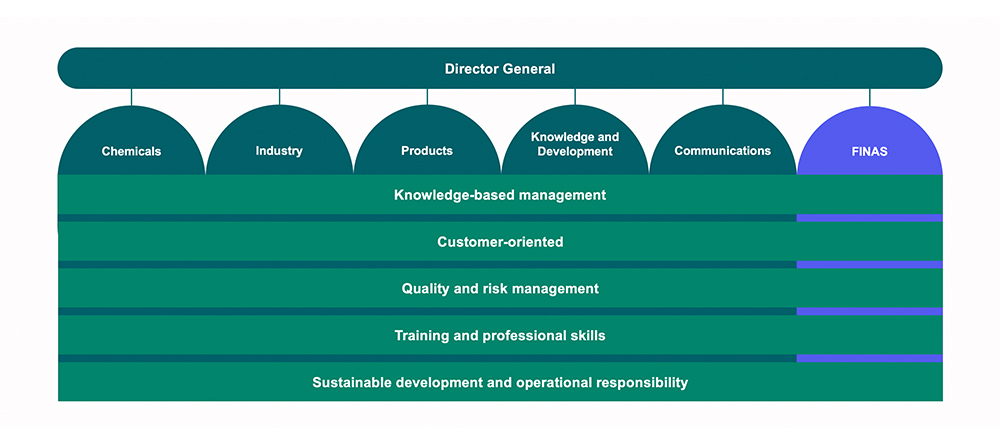Organisation
Tukes has five units: Chemicals, Industry, Products, FINAS, and Information and Development.
Approximately 250 Tukes employees work at our offices in Helsinki, Tampere and Rovaniemi.
Tukes operates under the guidance of several ministries. The Ministry of Economic Affairs and Employment (MEAE) is responsible for our administrative guidance. The MEAE works in cooperation with the Ministry of Transport and Communications, the Ministry of Agriculture and Forestry, the Ministry of the Interior, the Ministry of Social Affairs and Health, and the Ministry of the Environment, each managing their specific area of responsibility.
Organisational structure

Units
Read more about the work, tasks and responsibilities of the five Tukes units below.
Chemicals
The Chemicals unit handles the supervision of chemical products, the implementation and control of the EU REACH and CLP regulations, the execution of biocide legislation, and the risk assessments, approvals and registration of plant protection products. The unit also monitors the conformity of precious metal products.
Industry
The Industry unit monitors the safety of production facilities and equipment, mining operations, contracting and installation work, and inspection services. For example, it monitors industrial plants that process hazardous chemicals, liquid and natural gas sites, explosives factories and warehouses, pressure equipment, mines, ore prospecting and gold panning sites, and electrical equipment installation.
Products
The Products unit monitors the safety and technical reliability of products on sale, as well as the safety of consumer services. For example, it monitors electrical devices, consumer products, building products, explosives and fireworks, hazardous substance transport packaging and containers, fire safety equipment, and the electromagnetic compatibility and energy efficiency of electronic equipment. The unit also hosts the single-liaison office for market supervision (Fipoint).
FINAS
FINAS is Finland’s national accreditation body that certifies calibration and testing laboratories, certification bodies, inspection bodies, providers of proficiency testing, greenhouse gas and EMAS verifiers, and biobank operators. FINAS operates as an independent and impartial unit within the Tukes organisation.
Information and Development
The Information and Development unit of Tukes is responsible for the agency’s administrative services. It participates in developing the regulations, operating models, and information systems of our area of responsibility, also producing information services.